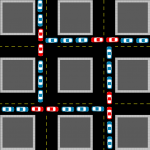Widgetized Section
Go to Admin » Appearance » Widgets » and move Gabfire Widget: Social into that MastheadOverlay zone
A Matter of Perspective
 If there is one observation increasingly endorsed by conservatives and liberals alike it is this: American government isn’t working. Not in Washington, and not in a growing number of states.
If there is one observation increasingly endorsed by conservatives and liberals alike it is this: American government isn’t working. Not in Washington, and not in a growing number of states.
What has gone wrong? Why do our policymakers seem incapable of reasoned debate or compromise? Why are our political divisions so intractable?
The easy answer, of course, is politics. At the federal level especially, U.S. representatives elected from districts that have been gerrymandered to be bright red or deep blue are motivated by fears of a primary challenge from their respective, increasingly rabid bases. But I think we make a mistake by dismissing ideological gridlock as “just politics.” What we are witnessing is evidence of a conflict between worldviews, a policy debate between denizens of different planets who speak different languages and occupy different realities.
Let me just illustrate my thesis with an example from my own state, Indiana.
The Indiana General Assembly is considering a measure that would require drug testing as a condition of receiving welfare assistance (a proposal modeled on a Florida law that is currently enjoined by the Federal Courts). The arguments against that measure seem based upon logic and evidence: the Indiana Coalition for Human Services, for example, has pointed out that (prior to the program’s shutdown by the courts) Florida’s program proved to be ineffective and costly. Fewer than 3 percent of those tested were positive for drug use, and the amounts saved were dwarfed by the cost of testing. Others have noted that the available tests are not well-suited for a “pass/fail” situation. Indiana Legislative Services estimates the first-year cost to be 1.2 million, much more than is likely to be saved by cutting off those who fail the test. Etcetera.
These arguments—practical and fiscal—have failed to sway proponents of this measure, because those proponents are not motivated by a cost-benefit analysis. They may claim that they want to save taxpayer dollars, but the reality is that, for most of them, this is a moral issue. They are operating from a “makers versus takers” paradigm, a worldview that equates poverty with a failure of character.
Those who do not share that worldview don’t understand why Temporary Assistance for Needy Families (TANF) recipients should be singled out for these punitive measures. On local blogs and letters to the editor, opponents of the bill have argued that—should the bill pass–the “takers” category should be expanded to include the non-poor who are enriching themselves at taxpayers’ expense: recipients of corporate welfare and other beneficiaries of crony capitalism–the business enterprises that have persuaded lawmakers to grant them favorable tax treatment, the owners of sports teams we subsidize, the developers who get lucrative contracts with minimal risk.
Indeed, as one blogger suggested, if the justification for drug testing is receipt of taxpayer dollars, why omit all the elected officials? Shouldn’t we test everyone paid with tax dollars–teachers, police officers, firefighters, city employees–everyone we are supporting or enriching with public funds? Why single out poor people?
Sponsors and supporters of the drug testing measures dismiss these arguments out of hand; they simply do not see any parallel between the single mom who depends upon TANF and the corporate executive whose business relies upon government contracts and highly favorable tax breaks. They see the former as a “moocher” to be monitored and the latter as a productive member of society to be rewarded.
No wonder they can’t communicate with each other.
Americans are familiar with many of the intractable issues that grow out of contending moral or religious beliefs. We understand that our perennial arguments about abortion or gay rights are rooted in religious ways of seeing the world. What we are just beginning to understand is that views on the economy, on wealth and poverty, even on the environment, also proceed from deeply-held, albeit largely unconscious ways of comprehending reality.
When the United States was a thinly-populated agrarian society with a largely invisible federal government, these conflicts in worldview were less obvious and their effect on policymaking was less pernicious. Even so, however, the Founders attempted to ameliorate the clash of worldviews by limiting the proper sphere of government. With modernity and the advent of the administrative state—where citizens of the nation and the world are more firmly connected to each other every day, and where decisions made by Congress and state legislatures affect more and more people—we can no longer pretend that these divisions don’t exist, or that they don’t matter.
Unless we find a way to communicate, unless we learn to live in a world we can all recognize, substantial numbers of Americans will cease to view our government as legitimate, and our ability to conduct affairs of state will be compromised beyond recognition.
This is the root of the specific challenges we face, and it’s confounding.
____________________________________________________________________________
Author: Sheila Suess Kennedy is a Professor of Law and Public Policy at the School of Public and Environmental Affairs at IUPUI.


Follow Us!